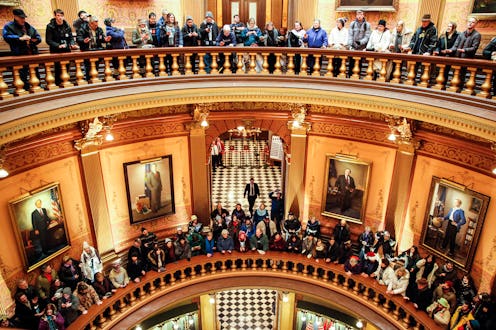News
Here's Why There Are Two Dates For Electoral Votes
The Electoral College is a fun house of quirks, as many Americans are learning this election cycle. The winner of the popular vote is not necessarily the winner of the election. Certain states have outsized electoral heft, which explains why candidates cater to a handful of "swing states," rather than the nation-at-large. Electors can technically buck protocol and vote their conscience, but it's rare, and some states have laws designed especially to discourage individuals from getting any ideas. (Michigan and Minnesota will replace a "faithless elector" with someone demonstrating party fidelity.) Add to the list of oddities this: Although the Electoral College votes cast yesterday are supposedly sealed and delivered unto Washington D.C., to be read on Jan. 6 and ratified by Congress, we know already how everyone voted. But how?
The simple answer is, the votes were announced. In some states, like Delaware, the entire proceedings were not only made vocal, but also recorded for digital posterity. In a small state, perhaps this task is easier. Delaware gets only three electoral votes total, and you can watch all three female electors introduce themselves and sign their votes. The process is made human here, and wonderfully so, a little sparkle of democracy working well.

The process varies from state to state. True to its claim that "Everything's bigger in Texas," the Lone Star state took over two hours just to choose who would be the chairperson of the day. Once they made their decision (at last), the voting was conducted by secret ballot, but the results were read and announced for all to hear. That's when Texas delivered another surprise, in the form of a rogue elector vote for Sen. Ron Paul. No one knew who the Paul fan in the crowd was, though the other Texas elector defector, Chris Suprun, said he hoped that person would come forward. Suprun gave his vote to Gov. John Kasich, making Texas home to the second-largest faithless elector faction. Washington state had the most, with three Democrats opting to vote for Colin Powell rather than Hillary Clinton.
Confusion over why we "know" who won the Electoral College vote, but must wait for Jan. 6 to have that officially recognized is understandable. But the answer is simple: this is the process. Wonky, inefficient, at times inexplicable, and sometimes endearing, most Americans have probably never been this up close and personal with the Electoral College. Hopefully, they'll never have to be again either.
